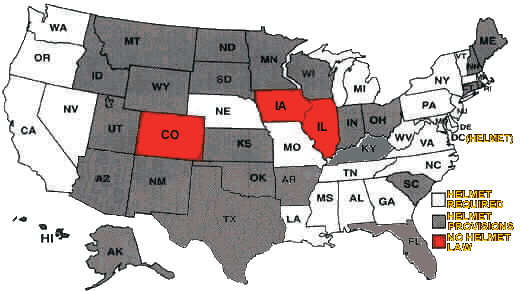|
Regardless of laws, wearing a Motorcycle helmet is a personal choice. Iron Horse Helmets offers you a great choice in motorcycle helmets to suit the riding you do. While we wish our customers as well as all who ride to be safe and have the proper protection, the decision is up to you. Our selection can assist you in purchasing the right motorcycle helmet for your needs.  |
The history of motorcycle helmet laws in the United States is characterized by change. In 1967, to increase motorcycle helmet use, the federal government required the states to enact helmet use laws in order to qualify for certain federal safety programs and highway construction funds. The federal incentive worked. By the early 1970s, almost all the states had universal motorcycle helmet laws ("universal" in the sense that they covered all riders). Michigan was the first state to repeal its law in 1968, beginning a pattern of repeal, reenactment, and amendment of motorcycle helmet laws. In 1976, states successfully lobbied Congress to stop the Department of Transportation from assessing financial penalties on states without helmet laws. By 1980, most states had repealed or limited their motorcycle helmet laws to cover riders younger than 18, but not older riders. Later states that had repealed the law, reinstated it but only for young riders. All but 2 states (Illinois and Iowa) now require some or all motorcyclists to wear helmets. Since 1997, Arkansas, Florida, Kentucky, Pennsylvania, and Texas have changed their laws covering all riders to apply only to young riders. And most recently, Louisiana moved from a partial to a universal motorcycle helmet law. The changes in helmet laws have created a natural laboratory for researchers to study the effects of the laws on helmet use rates and on motorcycle deaths and head injuries. Helmet use rates approach 100 percent under universal laws (currently, in 20 states and the District of Columbia), but partial laws that cover only some motorcyclists (currently, in 27 states ) are widely disobeyed. Repeatedly, research has shown that universal helmet laws reduce deaths and serious injuries among motorcyclists. The sharp reductions in helmet use resulting from weakening or repealing motorcycle helmet laws are followed by significant increases in injuries and deaths. Research in Texas is illustrative. The universal helmet law in Texas is estimated to have saved 650 lives between 1968 when it went into effect and 1977 when it was first amended. The amended law covered only riders younger than 18 and its enactment was followed by a 35 percent increase in motorcyclist fatalities. Texas reinstated universal coverage in 1989. Helmet use which had dropped to 41 percent under the partial law, promptly rose to 98 percent and serious injury crashes per registered motorcycle decreased by 11 percent. The pattern repeated in 1997 when Texas again rolled back the law to apply only to riders younger than 21. In less than a year, helmet use was down to 66 percent, and operator fatalities increased 31 percent in the first full year of the new law. For references and further research, see Q&A: Motorcycle helmet use laws. Bicycle helmets also prevent injuries, but no state has a universal bicycle helmet law. Only 21 states and the District of Columbia and the District of Columbia have statewide bicycle helmet laws, and they apply only to young riders (often riders younger than 16). Local ordinances in a few other states require bicycle helmets for some or all riders |
| Information Provided by : Insurance Institute for Highway Safety, Highway Loss Data Institute Last modified: 04-Dec-2001 |
